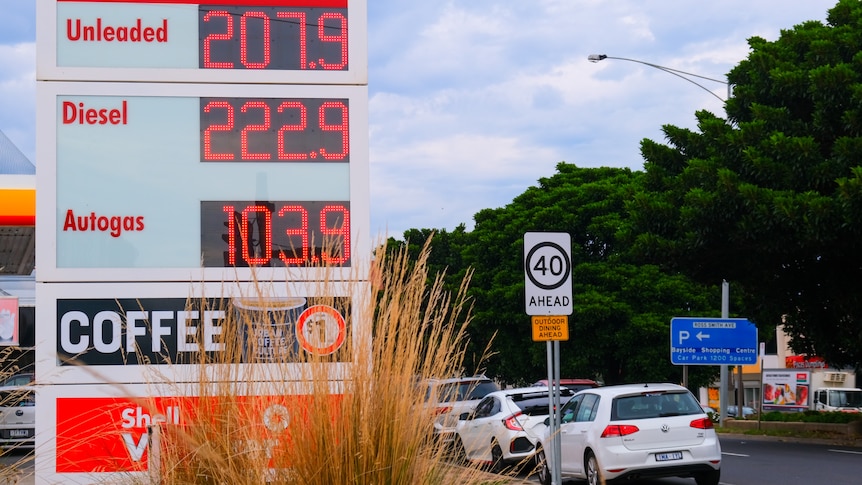Coalition and crossbench MPs are calling on the federal government to extend fuel price relief beyond the end of September, in an effort to counter the rising cost of living.
Key points:
- The cost of fuel will rise by 22 cents on September 29
- David Gillespie said it was hoped fuel prices would have failed quicker when the final date was set
- The Treasurer has repeatedly ruled out extending the excise
The halving of the fuel excise — at 44 cents a liter tax on fuel — is due to expire on September 28.
It means prices will rise by 22 cents a liter after September 29.
For months the federal government has insisted the measure cannot continue beyond that date due to the significant cost to the budget.
The end date was set by the Morrison government, as the measure was included in the March budget.
But Nationals MP David Gillespie argues when that date was decided, there was genuine hope prices might have fallen further by now.
“When those announcements were made, the thought was that things might turn back to normal pretty quickly,” he said.
“We were hoping that Ukraine and Russia might come to terms, and there would be a flow of liquid and gas as per normal, but that is definitely not happening anytime soon.”
Mr Gillespie said an extension to the price relief can now be justified.
“It is a reasonable response to an extraordinary situation, a shortage of liquid fuel around the world,” he said.
Mr Gillespie’s colleague, Nationals MP Darren Chester, also agreed that while prices remained high, the interim measure had to remain in place for longer.
“I would like it extended given the disproportionate impact it has on regional motorists who often don’t have access to public transport,” he said.
“At a time when regional tourism is recovering, we also want to see city people choosing a domestic holiday and supporting local jobs.”
Their calls are echoed by Liberal backbencher Bridget Archer, who represents the northern Tasmanian seat of Bass.
Ms Archer said fuel prices are taking a heavy toll, and the government needs to either continue providing some relief — or come up with other assistance.
“The cost of living is rising daily and the high cost of fuel is having a significant impact on almost everyone who lives in my community which has a knock-on effect,” she said.
“I would like to see an extension of the fuel excise relief and if the government chooses not to, they must demonstrate what they will do to support individuals and families who are struggling.”
‘Take a staggered approach’
The new independent member for the western Sydney seat of Fowler, Dai Le, said her community will struggle to absorb the price rise.
“Families out in western and south-western Sydney, in electorates like mine, are really struggling with all of these higher prices for everything,” she said.
“So that’s why I have been asking the government to really consider extending the fuel excise when it ends in September.”
Ms Le wants to see the relief extended for a further six months, taking it into 2023.
But she said if the government won’t agree to that, it should stagger the increases in the excise, rather than returning it all at once.
“At least take a staggered approach, to incrementally (increase) the fuel excise over the next few months,” she said.
“But from my understanding the government will not budge.”
Ms Le called on Labor MP’s in western Sydney to join her call for the measure to be extended, arguing their communities are in a similar position.
Some Labor MP’s in the area have told the ABC it is a complex problem, and acknowledge their constituents will feel the impact heavily.
Government remains reluctant
Treasurer Jim Chalmers has been repeatedly asked to rule out extending the fuel excise in recent weeks.
On each occasion he has warned Australians not to expect an extension, and pointed to the enormous cost to the budget — estimated at $3 billion over six months.
New Zealand recently extended its fuel excise relief primarily in an effort to drive down inflation.
The Coalition has not adopted a formal position supporting an extension beyond the date they set in government, however the issue is expected to be discussed in the partyroom.
During question time on Monday, Opposition leader Peter Dutton asked the Prime Minister if it would be extended.
“Will your government compound on household budgets by not extending the fuel excise relief? Why is Labor making a bad situation worse?” Mr Dutton asked.
Anthony Albanese responded that Mr Dutton was part of the government that designed the fuel excise cut, and its end date.
“I point to the fact that (the Opposition leader) was in the Cabinet that put together the budget that had the end date for the measure that he talks about,” he said.
.
